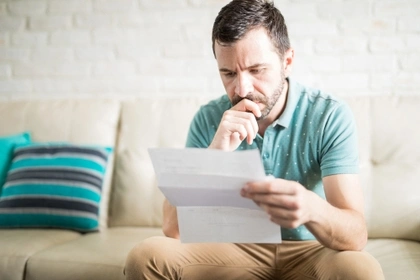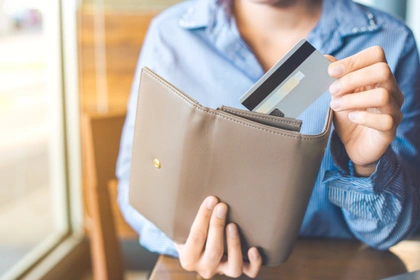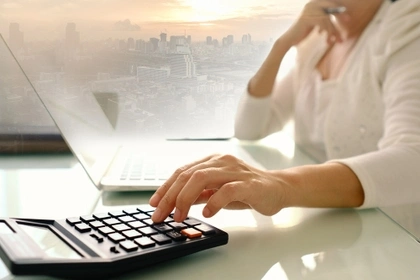When should I pay my credit card?
Payments on credit cards are usually monthly, you can find out from your lender when yours is due. This is the amount of time you have where no interest is charged, usually a month, if you repay in full. Certain cards offer longer interest-free periods as an incentive for signing up, so you may have longer to pay that money back (you will still need to meet the minimum monthly payment each month, though).
“It’s a good idea to set up a Direct Debit, ideally a few days before your due date.”
This should ensure you pay on time each month and help you keep on track.
To help you understand what we mean by this, here are two terms it's important to know the ins and outs of:
1. Credit utilisation ratios
This is the amount of money you have available to you versus how much of it you actually use. For example, if your credit card has a limit of £1,500 and you’ve used £750 of that, your ratio would be 50%.
2. Balance reporting
Your credit card issuer will report your balance to the credit reference agencies (like TransUnion, Experian and Equifax) once a month, however, the date of this isn’t necessarily the same as your due date.
Because of this, if you wait until your due date to clear all or some of your balance, your credit utilisation ratio could appear higher than it actually is and impact on your credit score.
For example, let’s say your due date is the 25th of every month. You have a credit card limit of £1,500 but this time you’ve spent £1,000 of it to finance a new dishwasher. You have every intention of paying your dishwasher off and bringing your account back down to normal by your due date, but your credit card provider does its reporting on the 19th of every month.
In their and credit reference agencies’ eyes, your credit utilisation ratio would be 66%.
How do I find out when my credit card bill is due?
There are a couple of ways you can easily find this out:
- Check your credit card statement - you can find the due date at the top of this document.
- Call your credit card provider’s customer service team and ask them to confirm your due date.
- Check your lender’s app or your online account – it should clearly state your due date when you log in.
Do I have to pay my bill by a certain time?
If you want to avoid paying interest, yes. You don’t have to clear all your balance by your due date but if you don’t, you’ll be charged interest on everything you owe and over time this can add up and become pretty pricey.
How to avoid interest
Most cards come with an interest free period of around 40-60 days so if you pay your entire credit card bill off in full each month you’ll not be charged a penny in interest, making it a very cost-effective way to borrow. To make sure you don’t accidentally miss a payment one month, it might be a good idea to set up a Direct Debit to have it cleared in full by default (you can also do this to pay the minimum payment or an alternative set amount too).
If you have an outstanding amount on your card and are already paying interest, it could be worth transferring your debt over to a 0% balance transfer card - to explore this option in more detail head over to our complete balance transfer guide.
Can I change the date my payment is due?
You sure can and it’s a super quick process too. Simply call your credit card issuer (some may even let you do it online) and let them know what date you’d like to switch it to. It’s quite literally as easy as that. Bear in mind though, some credit card providers only allow a certain number of changes per year.
How much of my credit card bill should I pay?
This depends entirely on how much you owe but in an ideal world, all of it. If that’s just not feasible try to clear as much as you can to keep your credit utilisation ratio below 30%.
The former will prevent you from having to pay any interest and the latter will limit any damage to your credit score.
Is it bad to pay off my credit card before the due date?
Absolutely not. As we touched on at the start of this guide, paying off your credit card before its due date could actually help you by keeping your credit utilisation ratio in a good place.
I have an interest-free period, when should I pay my bill?
Even though you’re not paying interest each month, it’s a good idea to keep on top of your payments. Otherwise, you could end up with a mound of debt that’s impossible to clear as your interest-free period nears its end.
Either way, to avoid paying interest full stop, aim to completely wipe your balance before the interest-free period expires.
What happens if I miss a payment?
This should be avoided at all costs but if it isn’t, three things will happen:
- You’ll be charged interest on the outstanding amount
- You may be charged a penalty fee
- Your credit score will take a knock.
While one and two might be pretty repairable within the next billing month, number three could linger around and a single missed payment stays on your credit report for six years.
Ocean Credit Card
See if it's a YES before you apply
- Up to £8,000 credit limit
- Checking won't affect your credit score
- Get a response in 60 seconds
Intelligent Lending Ltd (credit broker). Capital One is the exclusive lender.

Disclaimer: All information and links are correct at the time of publishing.






